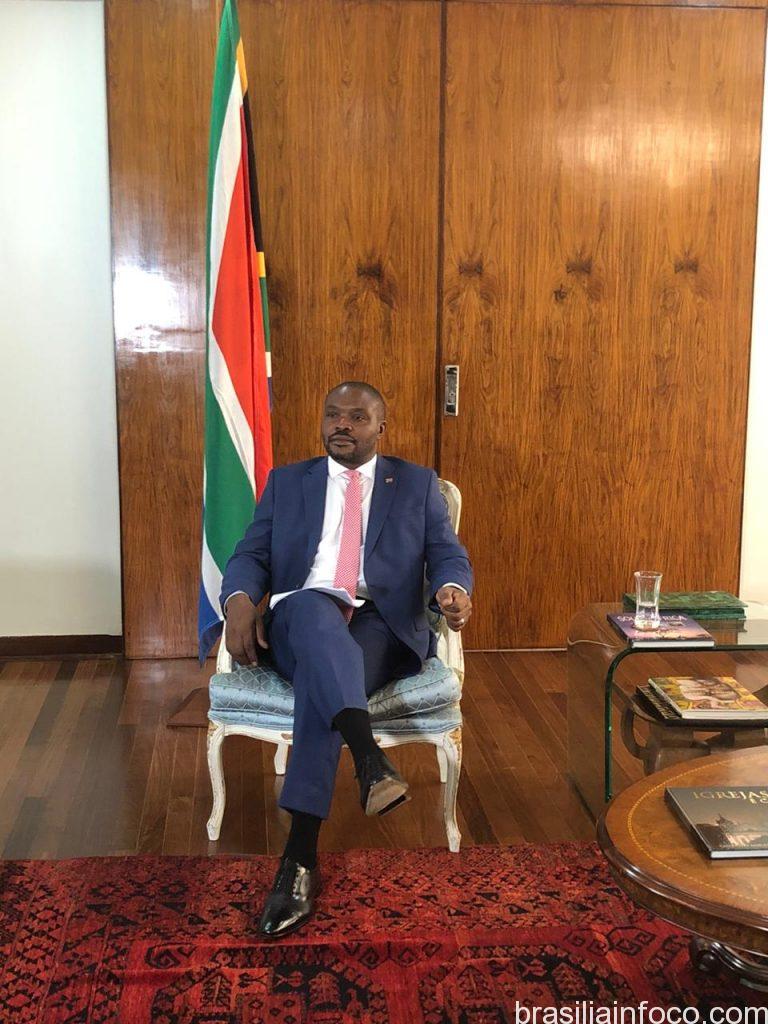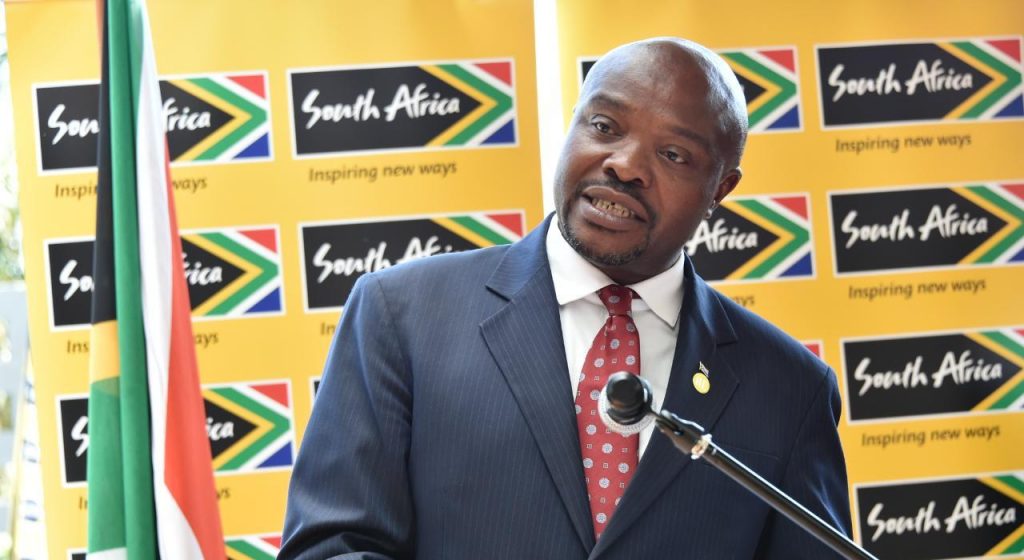Ambassador Mashimbye’s Interview with Brasilia in Foco Done by Journalist Fabiana Ceyhan
5 May 2020

What is the situation in South Africa now about the Pandemic? Is South Africa in a lockdown?
The South African Government has been resolute that there should be no trade-off between lives and livelihoods and it has thus adopted an approach which first and foremost saves lives, whilst at the same time, protecting livelihoods.
South Africa’s first coronavirus infection was confirmed on 5 March 2020. Shortly thereafter, on 15 March 2020, President Cyril Ramaphosa declared a State of National Disaster in an effort to delay the spread of the virus and to avoid a mass surge in infections. This approach was supported by the principles of social distancing, restriction of movement and stringent basic hygiene practices. Delaying the virus allowed South Africa to prepare its health facilities to meet the inevitable increase in infections.
South Africa then implemented one of the world’s most stringent lockdowns at midnight on 26 March 2020, banning the sale of all goods and the provision of services, except those considered essential, and also confirming all non-essential workers to their homes for five-weeks. South Africa’s borders were closed except for the repatriation of South African citizens and for the import and export of cargo.
Commencing 1 May 2020, South Africa begun a gradual and phased recovery of economic activity by moving into Level-4 of a Smart Lockdown Alert System, with Level-5 being the highest rate of infections and therefore requiring the maximum level of restrictions on movement. Under Level-4, South Africa remains in lockdown, but millions of South Africans will be able to go to work under carefully controlled conditions. Limited activities have been allowed to resume subject to extreme precautions required to limit community transmission and outbreaks.
This “risk adjusted strategy” through which South Africa will follow a deliberate and cautious approach to the easing of current lockdown restrictions, is informed by data, expert advice, and the best evidence that we have. An abrupt and uncontrolled lifting of restrictions could cause a massive resurgence in infections and cause even greater damage to our economy.
At the same time, President Ramaphosa announced a historic R800-billion (R$200billion) economic relief package which is being utilised towards healthcare, the relief of hunger and social distress, support for companies and workers, the phased re-opening of the economy and finally supportive monetary and financial market measures.
Is the population accepting the Government Rules in a pacific way?
Perhaps the most important decision by President Ramaphosa was his insistence on a coordinated, inclusive and comprehensive approach to addressing the pandemic. The President continued to engage and consult a variety of stakeholders including all Cabinet Ministers, Premiers (Governors), Mayors, business, labour, NGOs, academia, religious leaders, opposition parties, sporting associations, trade unions, traditional leaders, experts and community representatives, all whom the President engages on a regular basis, with his National Command Council, which he chairs, meeting three times a week to also continuously assess, review an adapt Government’s measures.
As a result, South Africans have opened their hearts and their pockets. Community initiatives have sprung up all across the country even with the lockdown. Social media is filled with positive and uplifting stories, far outshining the few incidences of nefarious and illegal behaviour which one finds in all societies. Companies have modified their production lines to produce medical equipment and sanitisers which they have donated to Government and organisations in need, whilst NGOs have also re-purposed their work and directed resources towards fighting the corona virus.
A Solidarity Fund, established by President Ramaphosa mobilise resources from companies, organisations and individuals to combat the coronavirus pandemic has already seen billions of Rands having been pledged. The President, Deputy President, Ministers, Deputy Ministers and Premiers will take 1/3 salary cuts over the next three months to contribute to the Solidarity Fund. Opposition political parties, senior government leaders, Captains of Industry, big corporates, small businesses, academia and ordinary South Africans have all contributed toward the fund. Every resource is being mobilised to provide relief to our people and to mitigate the socio-economic impact of the pandemic.
South Africa will soon enter seven-weeks of the nation-wide lockdown, a situation which has demanded great fortitude, endurance and sacrifice from South Africans. It has not been easy and whilst patience is wearing thin, and frustration is growing, South Africans are in agreement that priority should be given to measures to contain the spread of the virus and to minimise loss of life.
There are naturally public debates regarding a number of the restrictions imposed at Level-4, but this reflects the vibrant and free democracy that we are. South Africa is a constitutional democracy and the government has committed to act based on consultation and science, in a fast changing world.
Please update us with numbers of cases
As of 5 May 2020, South Africa has 7220 cases, with 138 deaths and 2746 recoveries. Over 257 000 tests have been conducted and more than 7 200 000 citizens have been screened. The majority of infections are in the Western Cape, followed by Gauteng and then KwaZulu Natal.
For the first few weeks after its first confirmed case, the pandemic in South Africa followed an exponential curve similar to that of the United Kingdom, the United States, and many other countries. However, our numbers are substantially lower than any of these countries.
The evidence is clear that the national lockdown, which was implemented swiftly and efficiently, has worked,. This is in large part because ordinary South Africans from all walks of life have understood its importance and obeyed its restrictions.
The measures we have taken – such as closing our borders and prohibiting gatherings have undoubtedly slowed the spread of the virus. But the struggle against the coronavirus is far from over.
When is South Africa planning to return to a normal Life?
If by “normal life” you mean life before this pandemic, then I don’t think that anyone anywhere in the world will return to a so called “normal-life”. We have no choice but to adjust to a “new-normal” which will be with us for some time. This includes taking extra precautions when moving around and in gatherings; continuing to adopt social distancing, higher standards of hygiene and responsible behaviour; embracing technology in all aspects of our lives and reducing the excesses in our lives that we have been able to live without during the past few months.
The goal for South Africa is to move, as soon as possible towards the Level-1 of the alert system where most normal activity can resume, with precautions and health guidelines followed at all times. However, there are times lines for moving between the Levels, South Africa will continue to be guided by data, statistics and science and should the situation deteriorate, it is possible to revert back to Level-5.
We also continue to monitor and learn from the measures taken by other countries, a several of which have already started to open up their economies on a larger scale. We are a community of nations; we have shared experiences and ideas with other countries and they have shared with us.
Please feel free to talk about anything related to the pandemic in South Africa.
The South African Government has resolved to use this atrocious virus as an opportunity to forge a new, inclusive and structurally sound economy in a new global reality. We realise that we cannot merely return our economy to where it was before the coronavirus. President Ramaphosa’s inclusive and consultative approach to addressing this virus, and also his determination to take all South Africans into his confidence, has increased the desire of all South Africans to contribute towards a better and more equal society. I am convinced that these new social compacts and alliances, across South African society, will not only disrupt weak systems and exposure systematic failures, but it will also bring innovation and creativity to the fore. This will be the greatest and most important legacy of this virus for South Africa and what we hope will be the “new normal”.









